The Recall API lets games manage links between Google Play Games Services (PGS) users and their in-game accounts by storing recall tokens with Google servers. Here's a sample scenario of how the Recall API might be used.
A user is playing a game where the developer has an identity system to track user progress, and uses PGS in parallel with other authentication methods to log users into their game. In this example, a user is logged into their PGS account Laura, and creates an in-game account with the developer's identity system called Racer94. As the user plays the game, the developer's game server syncs their progress.
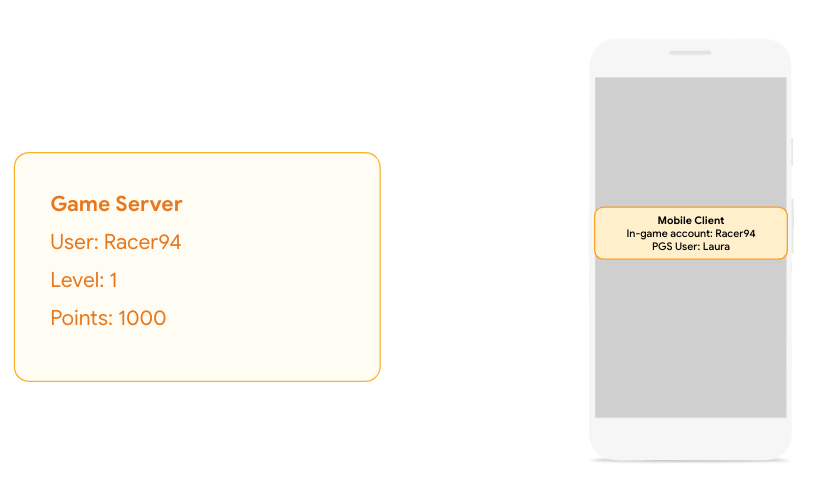
Separately, the developer saves a recall token with Google, which corresponds with the user's in-game account. Google automatically stores that recall token against the user's PGS profile.

The user now decides to play the game on GPG on PC for the first time. The user is automatically authenticated with their PGS account, and the game client checks to see if there is any progress available for this PGS user. The game server then queries Google to see if there are any tokens for this PGS account. Since there are, Google sends back the recall token, and the game server uses that token to find the user's associated account Racer94, and restore their progress. Since authenticating with PGS is a frictionless experience, the user's progress is restored by the app without the user needing to enter a username or password. Furthermore, the developer can use PGS authentication with their existing identity system, and rely on Google to store the link between player progress and their PGS account.

As seen in the example earlier, there are two main actions which are performed by the Recall API:
Storing the token with Google when a user logs in with one of the in-game accounts.
Retrieving the token for a user in order to restore their in-game accounts.
In addition to recall tokens, the Recall API also requires a stable identifier corresponding to the in-game account, known as persona. You might think of a persona as the label which represents the user's in-game account within the developer's identity system, and the recall token as a key which is used to restore the user's in-game account to the game. Persona and token values must not be reused across different PGS projects. Also, while recall tokens may be changed over time, a persona should be stable according to the user's in-game account.
Technical flows for storing and retrieving the recall tokens
This section covers the technical flow between the game client and servers with Google servers when storing and retrieving recall tokens.
Step 1: Authenticate the PGS User and retrieve the session ID
The game initializes the PGS SDK and attempts to authenticate the user with PGS.

Assuming the user is authenticated, request a session ID from the Games SDK on the game client, and request an OAuth 2.0 token from Google's OAuth backend. The session ID and OAuth 2.0 tokens are used to communicate with the Google Games backend.
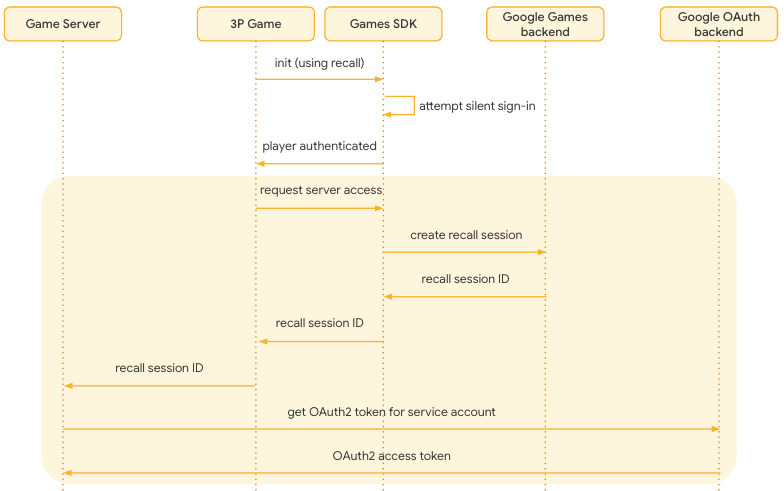
Step 2: Retrieve any available recall token
Request for any associated recall token with the PGS user's account. If a token is present, proceed to Step 3a and restore progress. Otherwise, if this is a new user and they have no token present, proceed to Step 3b and store a new token.
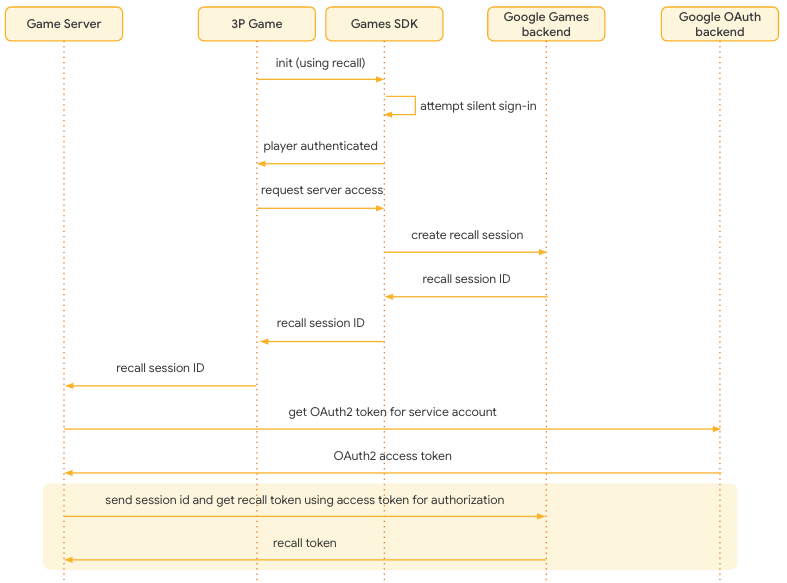
Step 3a: If token is present, restore progress
If a token is present, retrieve and decrypt the token, and restore user data.
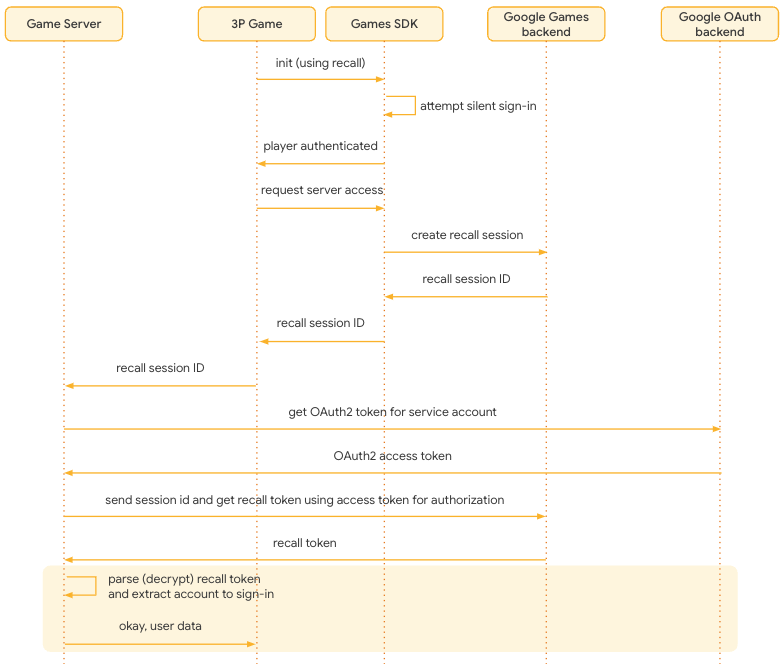
Step 3b: If no token is present, store a token
Since no token is present, no progress is restored. The user proceeds to platform authentication with the developer's identity system, or creates a new account if one does not exist. Note - this isn't authenticating in with PGS (which has been done already), but with a developer's identity system outside of PGS.

Create an encrypted recall token which encodes the user's in-game account, and send it to Google along with the session ID and OAuth 2.0 token. At this point, Google creates an association between the recall token which was sent, and the player's PGS account.
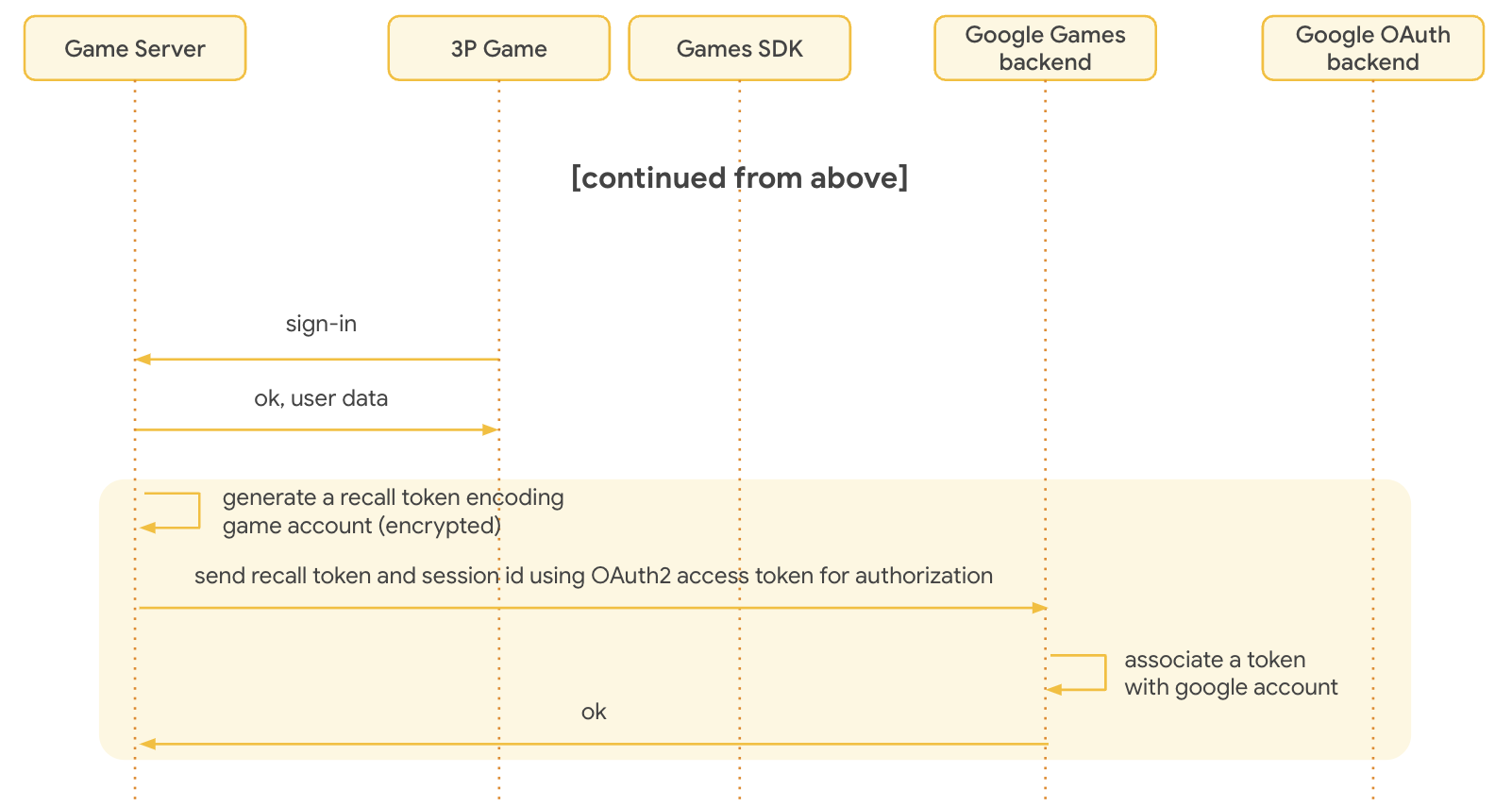
Flows for users without a PGS profile
You can store recall tokens for a user who hasn't created a PGS profile yet by using profileless mode. However, there are two important caveats:
- You can't retrieve tokens for a user who doesn't have a PGS profile. Profile creation is automatically prompted when the user tries to log into your game with Play Games Services on a second device.
- You must follow additional guidelines
to ensure you have an appropriate notice describing the following items and
obtaining the appropriate end-user consent:
- Your sharing of the data with Google to enable the Play Games account linking feature.
- The availability of settings to manage this sharing, such as Play Games settings.
- The processing of such data under the Google Privacy Policy.
Store a token and persona pair
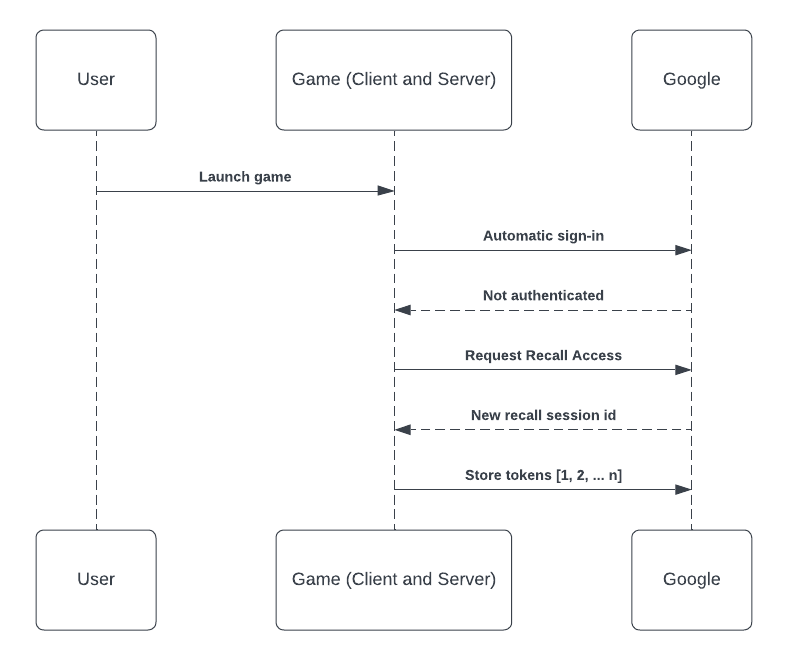
- A user without a PGS profile opens a game that has profileless recall enabled.
- The Games SDK triggers an automatic platform authentication, which fails because the user has no PGS profile.
- The Games SDK shows a snackbar that informs the user that the game has integration with Google. This snackbar is actionable—the user can disable recall until a profile is created.
- The game requests recall access. Note that PGS rejects recall access requests when there are PGS profiles on the device or when there are no Google Accounts on the device. In that case, the game should proceed without using PGS.
- After the user logs in with an in-game account, the game creates a token and persona pair for the user that corresponds to their in-game account. The game stores this pair with Google. The game might store more tokens later if the user logs into other in-game accounts.
Launch a game on a new device
- A user without a PGS profile opens a game that has profileless recall enabled on a device.
- The game records a profileless recall token as described in Store a token and persona pair.
- The user opens the same game on a different device that has the same account setup.
- The Games SDK triggers profile creation. The user can review and reject previously stored recall tokens. The user creates a PGS profile at this time.
- The automatic platform authentication into PGS completes, and the game receives the authenticated status.
- The game retrieves recall tokens for the user as usual.
Next steps
In order to integrate the Recall API with your client and game server, follow this guidance.
